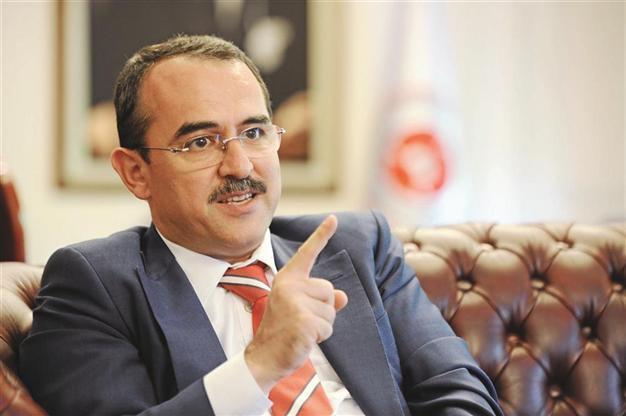Turkey’s government mulls taking peace process to Parliament
ANKARA - Hürriyet Daily News

Justice Minister Sadullah Ergin signals that a new delegation from the Peace and Democracy Party (BDP) could visit İmralı Island today or tomorrow. DAILY NEWS photo / Selahattin SÖNMEZ
Turkey’s government could consider allowing Parliament to participate in a peace process to end the Kurdish issue, the justice minister has said while noting that a new delegation from the Peace and Democracy Party (BDP) could visit the outlawed Kurdistan Workers’ Party’s (PKK) jailed leader within days.The government might specifically take the PKK’s possible withdrawal from Turkey to the legislature, Justice Minister Sadullah Ergin told private channel Kanaltürk yesterday. “If this withdrawal will take place, if these terrorists will drop their arms and leave this soil, and if there is a need for a legal act to make it [possible], then we could take it to Parliament.”
Ergin, meanwhile, also said the government had inspected letters sent from the PKK to their imprisoned leader, Abdullah Öcalan, and found no problem with them.
Ergin’s statement came at a critical moment as Öcalan is expected to make a call for a long-term cease-fire to the PKK on March 21 amid continuing Nevruz celebrations. But more important and difficult than declaring a cease-fire is the withdrawal of thousands of PKK militants from Turkey.
Turkey’s government could consider allowing Parliament to participate in a peace process to end the Kurdish issue, the justice minister has said while noting that a new delegation from the Peace and Democracy Party (BDP) could visit the outlawed Kurdistan Workers’ Party’s (PKK) jailed leader within days.
The government might specifically take the PKK’s possible withdrawal from Turkey to the legislature, Justice Minister Sadullah Ergin told private channel Kanaltürk yesterday. “If this withdrawal will take place, if these terrorists will drop their arms and leave this soil, and if there is a need for a legal act to make it [possible], then we could take it to Parliament.”
Ergin, meanwhile, also said the government had inspected letters sent from the PKK to their imprisoned leader, Abdullah Öcalan, and found no problem with them.
Ergin’s statement came at a critical moment as Öcalan is expected to make a call for a long-term cease-fire to the PKK on March 21 amid continuing Nevruz celebrations. But more important and difficult than declaring a cease-fire is the withdrawal of thousands of PKK fighters from Turkey to northern Iraq, which would eventually mean the end of the group’s armed struggle.
Öcalan and the PKK’s leaders in northern Iraq have voiced their concerns about the withdrawal and demanded the establishment of a parliamentary commission to observe the process. Ergin’s words seemed designed to meet their concerns, although the minister did not refer to the establishment of a monitoring committee.
Ergin also said Parliament could hold a secret session in which the government could inform opposition parties about the ongoing peace process, a day after the main opposition Republican People’s Party (CHP) urged Prime Minister Recep Tayyip Erdoğan to inform the people about what has been negotiated with Öcalan.
“There is road map whose framework has been set. And the sides are acting within the boundaries of this framework,” Ergin said, adding that the process was proceeding positively.
Letters handed to Öcalan
Letters sent by the Kurdistan Communities Union (KCK), the alleged urban wing of the PKK, and its Europe branch to Öcalan include positive aspects for the successful continuation of the peace process, according to the justice minister.
“They contain no problematic issues. There are no serious problems [with regard to the content of these letters],” he said.
The letters were delivered through intelligence officials, said Ergin. The letters are particularly important as they will create the basis of Öcalan’s call to the PKK, expected to be read on March 21 during the Nevruz celebrations, with expectations that the imprisoned leader will ask the organization to cease its armed struggle.
The missives were discussed during a meeting between Erdoğan, Ergin and National Intelligence Organization (MIT) chief Hakan Fidan late March 15. The co-chair of the Peace and Democracy Party (BDP), Selahattin Demirtaş, broke his silence on March 16 on the process only after government signaled its satisfaction with the letters.
“These letters are not solely addressed to Öcalan. The government also reads the answers. So they also serve as a support for the government, helping it to carry forward the process,” Demirtaş said, adding that the third parliamentary delegation was set to visit Öcalan on İmralı Island within days.
There was no official statement on when the delegation will visit Öcalan, but Ergin said the third BDP team could depart for İmralı either today or tomorrow depending on weather conditions. Ergin signaled that the composition of the delegation could be changed but did not provide details. BDP sources said Demirtaş could replace Altan Tan while Sırrı Süreyya Önder and Pervin Buldan could still be in the delegation.
This delegation is set to transmit Öcalan’s call, which would be read during the Nevruz celebrations in Diyarbakır on March 21. Demirtaş hinted that the call could be conveyed by independent Diyarbakır deputy Leyla Zana, an iconic figure of the Kurdish political struggle. BDP sources also said the PKK could abide by Öcalan’s call for a long-term cease-fire, but a withdrawal from Turkey to northern Iraq and disarmament are not considered likely in the short run.
The negotiations will likely be based on the assurances the PKK and the BDP will seek from the government in this regard.
















